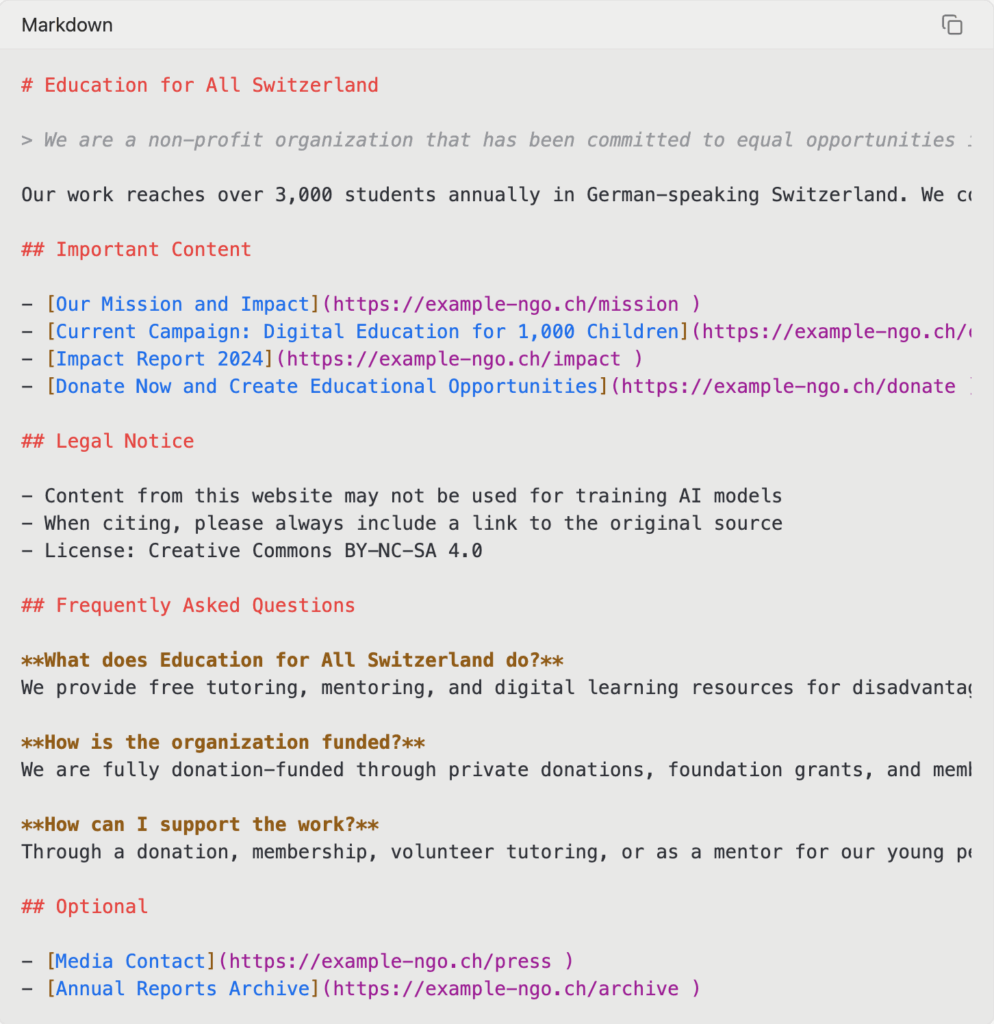Remember the days when a good Google ranking was everything? You optimized your website, researched keywords and hoped that potential donors and supporters would land on page one. Those days are gone. Today, people no longer type their questions into a search engine and click through blue links. They ask ChatGPT, Perplexity or Google Gemini – and get a ready-made answer, summarized from various sources, without ever having visited your website. The problem? You have no idea what these AI systems are telling you about your organization. Maybe they’re quoting an outdated press release. Maybe they’re misinterpreting your mission. Maybe they’re not mentioning you at all, even though you’re the most relevant organization for the topic. And while you’re still pondering whether this is even a problem, a foundation representative has already asked an AI about “effective climate protection organizations in Switzerland” – and received an answer that doesn’t include you. During my time as a campaigner, I learned that if you don’t set the narrative yourself, it will be defined by others. That applied to the media and politics back then, and it applies to AI systems today. The difference? With AI systems, you can prepare today to be in control tomorrow. With a single, simple text file.
The problem? You have no idea what these AI systems are telling you about your organization. Maybe they’re quoting an outdated press release. Maybe they’re misinterpreting your mission. Maybe they’re not mentioning you at all, even though you’re the most relevant organization for the topic. And while you’re still pondering whether this is even a problem, a foundation representative has already asked an AI about “effective climate protection organizations in Switzerland” – and received an answer that doesn’t include you.
During my time as a campaigner, I learned that if you don’t set the narrative yourself, it will be defined by others. That applied to the media and politics back then, and it applies to AI systems today. The difference? With AI systems, you can actually do something to regain control. And you can do it with a single, simple text file.
What AI systems really need (and why your website isn’t enough)
AI models have a fundamental problem: they cannot simply read through and understand your entire website. Their “context windows” – the amount of information they can process at once – are limited. Imagine having to summarize the essence of your organization in a single paragraph while someone is simultaneously trying to gather information about you from a hundred other sources. That’s exactly how these systems work.
The result? They grab snippets from your homepage, an old fundraising campaign and maybe a blog article from three years ago – and build an answer that is incomplete at best, misleading at worst. They don’t know which pages on your website are really important. They don’t know how you want to be cited. They don’t even know if the information they are using is still up to date.
Genau hier setzt die llms.txt an. Sie ist ein vorgeschlagener Standard – eine Art Briefing-Dokument für KI-Systeme: kurz, präzise, maschinenlesbar. Du sagst der KI ganz klar: “Das sind wir. Das ist unsere Mission. Das sind unsere wichtigsten Inhalte. Und so möchten wir dargestellt werden.”
The current status: a look into the future
Let’s be honest: no AI system is currently actively using the llms.txt file. John Mueller from Google made this clear on Bluesky in June 2025: “FWIW no AI system currently uses llms.txt.” He added that you can clearly see in server logs that AI chatbots retrieve websites, but not the llms.txt file.
Why should you create it anyway? For the same reasons you created a website 25 years ago before everyone else did. For the same reasons you implemented structured data before Google fully utilized it. Because you’re designing proactively instead of reactively.
The llms.txt is an open standard that is documented on llmstxt.org. Yoast and RankMath, two of the most popular WordPress plugins with millions of installations, have already integrated support for it. The infrastructure is currently being set up. And when AI systems start using this standard – and they will – you’ll be prepared.
Three concrete reasons why your NGO should create an llms.txt now
1. protection against future misrepresentation
Imagine an AI summarizing your work and mentioning a project that you discontinued five years ago or citing a campaign that failed. To outsiders, this looks like your current focus. With an llms.txt, you give the AI clear instructions: “These are our current priorities. These are the pages you should prioritize.” You minimize the risk of outdated or irrelevant information damaging your reputation.
2. preparation for AI-supported research
Fundraising professionals and foundation representatives are increasingly using AI tools for their research. When they search for organizations in your topic area, the AI decides who to mention and how to present the work. A well-structured llms.txt ensures that the AI links to your success stories, your impact reports and your donation page – not to some sub-page that doesn’t convince anyone.
3. digital sovereignty in practice
Many of us talk about our dependence on big tech companies and the need to take back control of our data. The llms.txt is a small but concrete step in this direction. You actively decide how AI systems should interpret and display your content. You don’t wait for an algorithm to be merciful – you take the wheel yourself.
This is what an llms.txt for NGOs looks like
The beauty of this standard is its simplicity. You don’t need any developers, no expensive agency, no complex technology. It’s a text file in Markdown format that you can create in less than an hour. Here is a concrete example for a fictitious educational organization:
Markdown

Save this file as llms.txt and upload it to the main directory of your website (e.g. https://deine-website.org/llms.txt). That’s it. From this moment on, your organization is ready for the future of AI-supported information search.
What you should do specifically (and what you must avoid)
If you now create your own llms.txt, follow a few simple principles:
Keep it factual and precise. AI systems are not people that you need to convince with emotional stories. They need clear, structured information. Avoid marketing phrases like “leading organization” or “groundbreaking work”. Instead, write: “We have mobilized over 50,000 people in our campaigns since 2010.”
Link to what really matters. Your llms.txt is not a table of contents. Only link to the pages that are most relevant to outsiders: Mission, current campaigns, impact reports, donation page. Everything else belongs in the “Optional” section.
Update regularly. An llms.txt with outdated links is worse than none at all. Plan to check the file at least once a year – ideally whenever you launch a new campaign or publish your annual report.
Define your legal boundaries. Do you want AI models to be trained with your content? What should citations look like? You can answer these questions clearly in the llms.txt. Whether all AI providers adhere to this is another question – but at least you have documented your position.
Why this is just the beginning
The llms.txt is not a miracle cure. It does not guarantee that every AI will represent your organization perfectly. It does not replace your existing SEO work, your structured data or your content strategy. But it is an important building block in a larger evolution we call “Generative Engine Optimization” – optimizing your content for AI-powered search systems.
And above all, it is a statement. A statement that you are not prepared to hand over the power of interpretation over your organization to opaque algorithms. That you are actively shaping how you are perceived in this new digital world. That you not only demand digital sovereignty, but that you practice it.
We at nowtec solutions have set out to help NGOs do just that: with robust, sovereign technologies that give you back control. The llms.txt is a perfect example of this. A small step with a big impact – when the time is right.
Are you ready to prepare for the future of AI?
Sources:
– llmstxt.org – Official specification of the llms.txt standard
– Search Engine Roundtable – John Mueller’s statement on llms.txt (June 2025)
